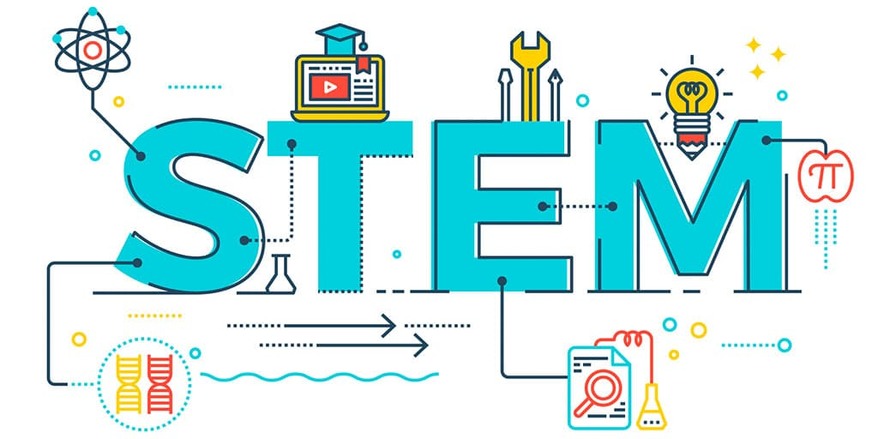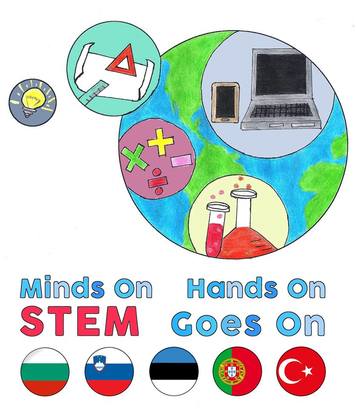Minds on Hands on STEM Goes on
In recent years, many studies have highlighted an alarming decline in young people’s interest in for STEM (science, technology, engineering and math) subjects. Therefore, we must consider how science education can meet young people's needs and how it can be meaningful and joyful for students.
In the light of the mentioned statements above, as we, coordinator and co-partner schools, think that STEM education, in formal and non-formal context can play a vital role.
According to the “need analysis” that we conducted at the preparatory process, most of the students are unsatisfied with the relevance and success to math and science courses. According the results of local and national exams, our students’ achievement on science and mathematics are less than other subjects. So we concern about this adverse situation.
Despite the fact that the teachers in the partner schools have adopted STEM education, they worry about their qualifications in this area and the activities to be implemented. We believe that we can change this adverse situation into favourable way with the work to be done in STEM education. Hence, exchange of the good practices and sharing experiences with their peers will be very beneficial for both our students and our teachers.
Although many activities have been carried in science, math and technology in our schools; particularly engineering applications are still inadequate. In other words, a holistic approach like STEM education which should be taught by an integrated way, has been instructed separately. For this reason, the most important contribution of this project would be the integration of the STEM subjects into the school curriculum by a holistic approach. We will develop and implement activities related to STEM education for the 6-7th and 8th grades in after school program. By sharing our results and outcomes with our partners, we will integrate STEM education into the school curriculum in the most effective way. In this context;
The main aim of the project is to make science and math education more relevant and meaningful for our students in the ways of respect, beliefs and cultural diversity. European Commission aimed to strength “basic skills” and “key competences” in EU member states for sustainable development and educational growth. In the line of this strategy regardless of background and abilities of the children, we aimed to improve our children’s “basic skills” as literacy, numeracy, science, and technology and “key competences” as knowledge, skills, and attitudes that will help learners to find personal fulfilment and, later in life, find work and take part in society.
These key competences include 'traditional' skills such as communication in one's mother tongue, foreign languages, digital skills, literacy, and basic skills in maths and science, as well as horizontal skills such as learning to learn, social and civic responsibility, initiative and entrepreneurship, cultural awareness, and creativity.
Besides the aims implied above, our project will contribute students’ and teachers’ competences below;
•improving attitudes toward STEM fields and careers
•engaging and supporting girls in STEM fields
•making students excited and enthusiastic about the natural world, learning about ecology and protecting environment
•Improving teacher competences and increasing their awareness on children needs and overcome difficulties in learning science
•broaden the understanding of practises, policies and systems in school education
•increasing opportunities for professional career development
•greater understanding of interconnections between formal and non-formal education
•having a positive impact on our wider school communities
During the Project, we will investigate how students, parents and teachers are engaged and affected by science in everyday life. In our activities and learning sessions, children will able to understand how science and scientist work.
We will set up meeting sessions for students and teachers to exchange experience and good practises, go camping in nature, visit museums and aquariums, prepare slowmation (slow animation) about science subjects, organise science fair and robot festival. All these activities are going to be carried at local and transnational level to solve real life problems.
Transnational cooperation provides us with;
-understanding of science education issues with the comparing participants and enhance their sense of active citizenship at local, national and international levels.
-exchanging views, sharing questions, and research carried out about the issue in international level
-provide exchanging best practices research and analysis activities,
-adaptation of solutions developed in another school,
-consulting, exchange of students and teachers, placements and study visits,
-establishment of institutional contacts for the purposes of future cooperation,
-learning about each other and learning how to act and operate together,
In the light of the mentioned statements above, as we, coordinator and co-partner schools, think that STEM education, in formal and non-formal context can play a vital role.
According to the “need analysis” that we conducted at the preparatory process, most of the students are unsatisfied with the relevance and success to math and science courses. According the results of local and national exams, our students’ achievement on science and mathematics are less than other subjects. So we concern about this adverse situation.
Despite the fact that the teachers in the partner schools have adopted STEM education, they worry about their qualifications in this area and the activities to be implemented. We believe that we can change this adverse situation into favourable way with the work to be done in STEM education. Hence, exchange of the good practices and sharing experiences with their peers will be very beneficial for both our students and our teachers.
Although many activities have been carried in science, math and technology in our schools; particularly engineering applications are still inadequate. In other words, a holistic approach like STEM education which should be taught by an integrated way, has been instructed separately. For this reason, the most important contribution of this project would be the integration of the STEM subjects into the school curriculum by a holistic approach. We will develop and implement activities related to STEM education for the 6-7th and 8th grades in after school program. By sharing our results and outcomes with our partners, we will integrate STEM education into the school curriculum in the most effective way. In this context;
The main aim of the project is to make science and math education more relevant and meaningful for our students in the ways of respect, beliefs and cultural diversity. European Commission aimed to strength “basic skills” and “key competences” in EU member states for sustainable development and educational growth. In the line of this strategy regardless of background and abilities of the children, we aimed to improve our children’s “basic skills” as literacy, numeracy, science, and technology and “key competences” as knowledge, skills, and attitudes that will help learners to find personal fulfilment and, later in life, find work and take part in society.
These key competences include 'traditional' skills such as communication in one's mother tongue, foreign languages, digital skills, literacy, and basic skills in maths and science, as well as horizontal skills such as learning to learn, social and civic responsibility, initiative and entrepreneurship, cultural awareness, and creativity.
Besides the aims implied above, our project will contribute students’ and teachers’ competences below;
•improving attitudes toward STEM fields and careers
•engaging and supporting girls in STEM fields
•making students excited and enthusiastic about the natural world, learning about ecology and protecting environment
•Improving teacher competences and increasing their awareness on children needs and overcome difficulties in learning science
•broaden the understanding of practises, policies and systems in school education
•increasing opportunities for professional career development
•greater understanding of interconnections between formal and non-formal education
•having a positive impact on our wider school communities
During the Project, we will investigate how students, parents and teachers are engaged and affected by science in everyday life. In our activities and learning sessions, children will able to understand how science and scientist work.
We will set up meeting sessions for students and teachers to exchange experience and good practises, go camping in nature, visit museums and aquariums, prepare slowmation (slow animation) about science subjects, organise science fair and robot festival. All these activities are going to be carried at local and transnational level to solve real life problems.
Transnational cooperation provides us with;
-understanding of science education issues with the comparing participants and enhance their sense of active citizenship at local, national and international levels.
-exchanging views, sharing questions, and research carried out about the issue in international level
-provide exchanging best practices research and analysis activities,
-adaptation of solutions developed in another school,
-consulting, exchange of students and teachers, placements and study visits,
-establishment of institutional contacts for the purposes of future cooperation,
-learning about each other and learning how to act and operate together,


